Positive Health Online
Your Country

Beneficial use of Seaweed in Special Diets
listed in nutraceuticals, originally published in issue 234 - November 2016
In a conventional diet of mainly land-grown and manufactured foods, careful choice and variety is required to provide all the daily nutrients the body needs to maintain homeostasis and adequately perform many complex functions. This presents a particular challenge in special diets, whether in special needs children, sport, weight management, pregnancy, convalescence, the elderly, or in the treatment of serious health conditions.
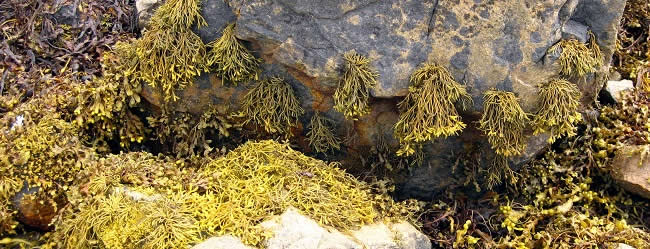
An unusual photo of Ascophyllum, Fucus, and Pelvetia spp. growing close together in the Outer Hebrides,
courtesy of Seagreens Trust
Certain varieties of ‘brown’ Wrack seaweeds of high food quality are today readily available from the cold north Atlantic, which provide a virtually complete profile of nutrients with an outstanding balance of micronutrients.[1] These are the same nutrient groups shown to be depleted in our foods,[2] and more especially in restricted diets.

Figure 1: Typical Nutrient Values
Since 2008 a British company Seagreens, has led applied research on these Wrack species, particularly Ascophyllum, Fucus, and Pelvetia spp. Two of their nutrition products combine three different species in well balanced forms for inclusion in everyday foods, yet with no unusual appearance or taste.[3] They also contain natural glutamates which produce ‘umami’ flavour, shown to stimulate salivation and taste in the elderly, improving appetite, weight, and overall health.[4]
It is as quick to add half a teaspoon to a soup, bread mix or a bowl of pasta as it is to blend it into a smoothie or fruit juice. There are also seaweed pieces which are briefly soaked in cold water for addition to normal vegetables and salads. The seaweed is certified allergen and contaminant free, organic, kosher, halal and vegan and has an excellent track record in wide food and therapeutic use. The same seaweeds are also ground and encapsulated, which makes them especially suitable for inclusion with other nutrition supplements in almost any therapeutic protocol.
This ready availability makes it particularly easy to replace nutrient sources that might otherwise be problematic. For example vitamin E with all its isomers avoiding grains like wheat germ; Omega fatty acids 3, 6, and 9 without eating fish or fish oils; all the B vitamins without dairy or meat; and important mineral trace elements depleted in land grown foods like zinc, selenium, iron, and magnesium.[2] Among hundreds of seaweed species the composition and availability of these wild Wrack species is outstanding.[5]
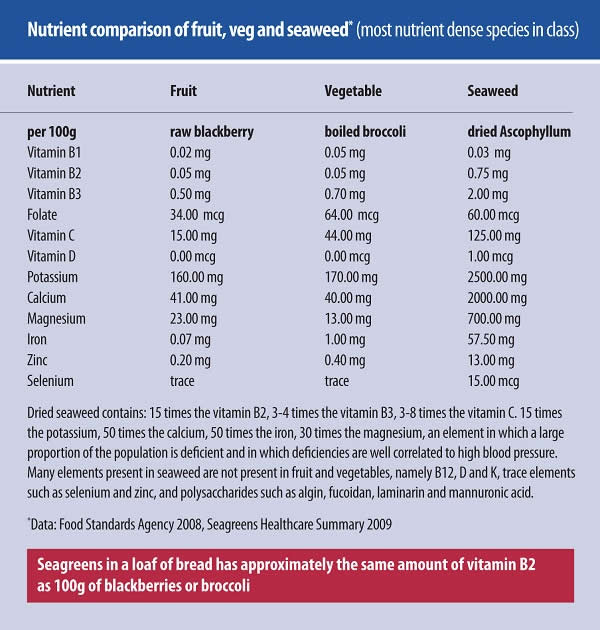
Figure 2: Comparison Seaweed with Fruits and Veg
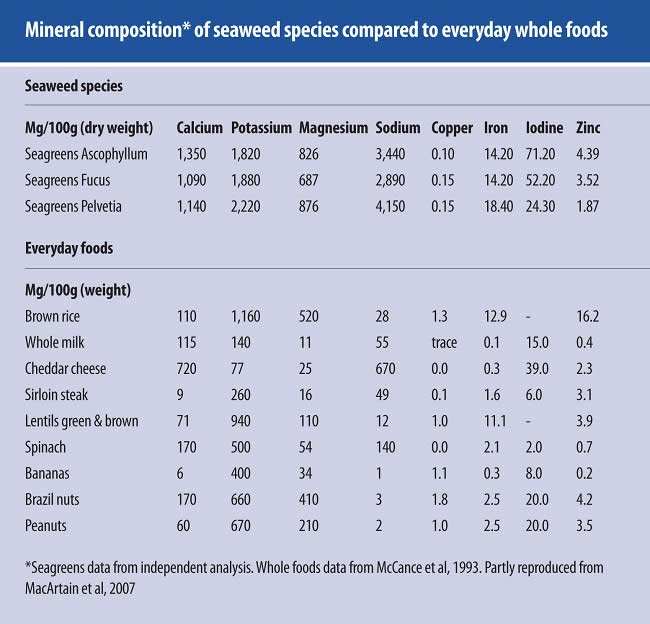
Figure 3: Seagreens Mineral Comparison
Recent research shows that very small amounts between 1 and 4 grams (a teaspoon) can not only fill the nutrient gaps in the daily diet, but includes significant levels of nutrient groups such as polyphenols, antioxidants and polysaccharides which aid digestion, intestinal healing, and detoxification,[6] as well as well-assimilated nutrients like iodine and its co-factors for thyroid hormone production.[7] Even these small amounts provide more soluble dietary fibre than 100g of wholemeal bread, brown rice or even lentils.
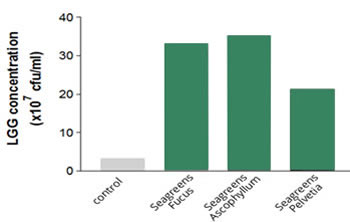
Figure 4: Seagreens Prebiotic Graph
As a natural, effective prebiotic (see Figure 4) the Seagreens® seaweed has been shown to prolong the release of sugars to the blood and lower the glycaemic index of foods which have appeal particularly to children with special needs, in obesity and diabetes. The studies show that it stimulates the secretion of pancreatic and digestive enzymes and beneficially inhibits others.[8, 9]
Its antioxidant capacity (see Figure 5) appears to remain high throughout the initial stages of digestion, surviving into the gut lumen where it provides protection from oxidative stress and damage to the gut wall.[10] As a rich and balanced source of all the minerals it is alkalizing in the blood, re-nutrifies circulation, and is an effective anti-inflammatory.
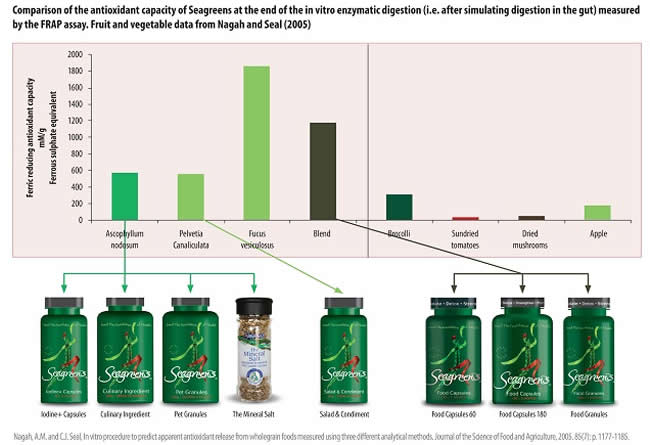
Figure 5: Seagreens Antioxidant Comparisons
A clinical nutritionist, speaking at an autism conference 10 years ago, found these seaweeds provided ‘optimum all-rounder nutrition’. “I see many abnormalities on the autistic spectrum: poor metabolism, hypothyroidism, heavy metals toxicity, elevated acid to alkaline, low levels of essential fatty and amino acids, poor electrolyte balance and low essential mineral elements”.[11] A profound insight, given what the latest studies show.
In most cases on the autistic spectrum and in metabolic disorders more widely, the phlorotannins, the main group of polyphenols in brown seaweeds are especially important for these anti-inflammatory properties.
Recent research has shown that phlorotannins in brown seaweed are well metabolised and absorbed in the large intestine. The antioxidant content of Ascophyllum can be up to 15% of its weight.[12]
References
1. www.seagreens.co.uk/nutrition .
MacArtain P, Gill C. I. R, Brooks M, Campbell R, Rowland I. R. Nutritional Value of Edible Seaweeds, Nutrition Reviews, Vol. 65, 12:535-543. 2007.
2. www.mineralresourcesint.co.uk/pdf/Mineral_Depletion_of_Foods_1940_2002.pdf.
Changing Diets, Changing Minds: how food affects mental health and behaviour, a joint report of Sustain: the alliance for better food and farming, in partnership with the Mental Health Foundation. January 16, 2006.
Feeding Minds: The Impact of Food on Mental Health, a report of the Mental Health Foundation (MHF), February 2006.
3. Seagreens® Food Granules are a unique blend of 3 species of wild Wrack which provides a particularly balanced composition of virtually all the nutrients. The blend is also available encapsulated as Seagreens® Food Capsules. The seaweed pieces are called Seagreens® Salad & Condiment. All three are available from most good health and natural food stores, on the internet and by mail order: www.seagreens.co.uk for stockists.
4. Sasano T., Shizuko Satoh-Kuriwada S., and Noriaki Shoji N (Division of Oral Diagnosis, Department of Oral Medicine and Surgery, Tohoku University Graduate School of Dentistry, 4-1 Seiryo-machi, Aoba-ku, Sendai 980-8575, Japan). The important role of umami taste in oral and overall health. Flavour, 4:10. 2015.
5. Cornish M. L, Critchley A. T, Mouritsen O. G. A role for dietary macroalgae in the amelioration of certain risk factors associated with cardiovascular disease. Phycologia, Volume 54(6), 649-666. 2015.
6. Skoryna S. C et al. Studies on Inhibition of Intestinal Absorption of Radioactive Strontium, Canadian Medical Association Journal 91:285-88. 1964.
Tanaka Y et al. Studies on Inhibition of Intestinal Absorption of Radioactive Strontium, Canadian Medical Association Journal 99:169-75. 1968.
Tanaka Y et al. The Binding of Lead by a Pectic Polyelectrolyte, Environmental Research 14:128-140. 1977.
Arica M. Y et al. Alginates bind heavy metals, Journal of Hazardous Material. 2004.
7. Combet E. Low-level seaweed supplementation proves iodine status in iodine-insufficient women. British Journal of Nutrition, 9:1-9. 2014.
8. Lyons V (Teesside University). Seagreens® as a potential prebiotic and the role of probiotic bacteria in the production of nitric oxide in macrophages. MSc Thesis, Teeside University. 2012.
9. Chater P. L. et al (Newcastle University). Inhibitory activity of extracts of brown Wrack seaweeds on lipase activity. Journal of Applied Phycology, 28:1303-1313. 2016.
10. Wheater H, (Dublin University). Comparison of Seagreens® antioxidant capacoty after enzymeatic digestion measured by FRAP assay (fruit & vegetable data Nagah and Seal, 2005). Release of polyphenols from brown Wrack seaweed following in vitro digestion. 2012.
11. Tommey, J. The Autism File, December issue. 2006.
12. Rowland, I. SWAFAX project , Hugh Sinclair Unit of Human Nutrition at Reading University, published in the British Journal of Nutrition, March 2016. 2013.
Comments:
-
No Article Comments available